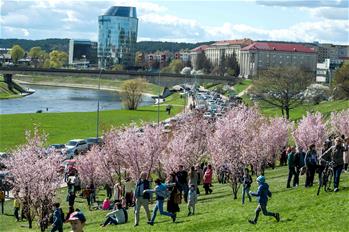FUZHOU, April 22 (Xinhua) -- Two years ago, Liu Jinqing, a farmer in east China's Fujian Province, was shocked that the 350 kilograms of dried sweet potatoes he had produced sold out online within a just few days.
Liu decided to focus on the potato business. In 2017, he produced 2,400 kilograms of dried sweet potatoes, making nearly 50,000 yuan (about 8,000 U.S. dollars), a handsome income for a farmer living in a remote village in the mountains.
E-commerce has helped poor farmers sell rural specialties and improve their livelihoods, as more and more people began to crave green and organic food, which farmers produce in abundance.
Chen Cuihua, head of a produce cooperative in Pucheng County, Fujian, said their annual sales volume climbed from 30 tonnes to over 100 tonnes after they opened an online shop.
Online retail volume in rural areas topped 1.24 trillion yuan in 2017, up 39.1 percent year on year, according to the Ministry of Commerce.
Over 9.8 million online shops were based in villages by the end of 2017, up 20.7 percent year on year, creating over 28 million jobs.
E-commerce is not the only digital technology that has benefited millions of farmers in China. Technology such as e-government, telemedicine, and intelligent monitoring are also transforming traditional lifestyles in rural areas.
In Dengguang Village, Fujian, 68-year-old Huang Jinguo lives alone in a hut, but he does not worry about burglars or falling ill.
"We have installed cameras in his house that are connected to the village's monitoring system, so that we can be alerted and offer help in the event of an emergency," said village official Huang Xiaolian.
Villagers can also learn about local affairs, watch TV programs, use shared bikes, and shop online via a "smart village" platform set up in 2015.
Besides bridging the rural-urban gap in terms of living standards, digital technology has also helped encourage migrant workers to return to villages, which have seen large numbers of farmers leave to find work in cities over past years.
Zeng Wei, 32, moved to Longtan Village, Fujian from neighboring Jiangxi Province, after he rented an old house to run a bookstore and teahouse, and another for a guesthouse.
"Thanks to the internet, e-commerce, and better logistics systems, rural life is not much different from that in the cities," said Zeng. "The countryside is a perfect place for freelance painters, writers, and designers who prefer to live close to nature."
As new inhabitants arrived in Longtan, the village became lively again. The local elementary school was reopened, with new arrivals as teachers.
"The best way to revive rural areas is to bring more people in," said Zhang Zhengrong, a local official.

















